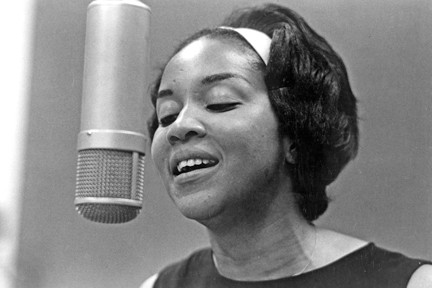Rejoice and Shout
AFF Day 5
[
{
"name": "Air - Inline Content - Upper",
"component": "26908817",
"insertPoint": "1/4",
"requiredCountToDisplay": "8"
},{
"name": "Air - Inline Content - Middle",
"component": "26908818",
"insertPoint": "1/2",
"requiredCountToDisplay": "8"
},{
"name": "Air - Inline Content - Lower",
"component": "26908819",
"insertPoint": "100",
"requiredCountToDisplay": "1"
}
]
A couple of years ago on a road trip through the American South, my fellow travelers and I had the good fortune to stumble onto the church where soul legend Al Green serves as a minister. Watching and listening to Green sing his praises to a higher power with his inimitable voice beat the hell out of touring Graceland, I’ll say that much. But as much as I enjoyed it, sitting in those pews made me feel like a tourist in more than one sense of the word. It seemed a little disrespectful to be there appreciating the music and not so much the message it was trying to deliver.
Rejoice and Shout, the Don McGlynn documentary about gospel music that I took in yesterday, is an absorbing lesson in both the history of the music and the devout faith it’s predicated upon. The first words we hear in the film come from Andrae Crouch, a pastor and gospel singer who insists that even atheists can hear the voice of god. But throughout the film, McGlynn and his interview subjects, including big names like Mavis Staples and Smokey Robinson, remind the viewer that gospel isn’t just another music genre. It isn’t just entertainment. It’s about praising a Christian god. Which is not to say that one can’t appreciate the form apart from the content, but it’s important to remember what these singers are saying and why they’re saying it.
I’ve always been fascinated by the passionate adoption of Christianity by a people who had the religion forced on them back in the days of slavery, as a means of “civilizing” them. McGlynn, to his credit, does get into this a little bit, showing how gospel music emerged from the combination of this newfound Christian devotion and spiritual-musical forms of worship brought over from Africa. As the film shows, African-Americans didn’t just adopt Christianity, they transformed it.
Of course, Rejoice and Shout gives the audience plenty to enjoy on a secular level, too. McGlynn’s made several jazz and blues documentaries, including films about Charles Mingus and Howlin’ Wolf, and he does a fine job of showing how gospel has evolved from the 19th century until today. It’s a musical form that has influenced and been influenced by blues, soul, pop, hip-hop and other genres, all while maintaining its connection to the church. Mixed in with the interview segments is performance footage, much of which, in a crowd-pleasing move, McGlynn allows to run for four or five minutes at a time. We get beautiful, complete songs that allow us to analyze the gospel’s subtle variations or simply drift away into the music.
Even a gospel “tourist” can see there’s something holy in the tunes Rejoice and Shout so lovingly documents.















